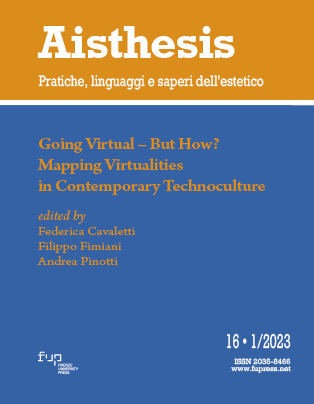Published 2023-07-22
Keywords
- virtual environments,
- ecology of perception,
- affordance,
- philosphy of the virtual,
- virtual realism
How to Cite
Copyright (c) 2023 Nicolas Bilchi

This work is licensed under a Creative Commons Attribution-NonCommercial 4.0 International License.
Abstract
The growing critical and economic success of Virtual Reality technologies is generating renewed scholarly interest in virtual environments. One of the most long-lasting and influential perspectives on the topic has been labelled «virtual realism» (Heim [1998]), and it has passed throughout the entire history of virtual environments studies up to recent days (Chalmers [2022]). Virtual Realism frames virtual environments in terms of realism, and precisely of perceptive soundness and isomorphism between physical environments and virtual ones, producing a convincing illusion of being physically present in the digital space. This article develops a critical counter-argument to this account. By employing James J. Gibson’s ecology of perception and Deleuze’s and Lévy’s philosophy of the virtual, the article aims at demonstrating that the ontology of virtual environments is rooted in a domain of predetermined possibilities, and that the resulting aesthetics can not be fully immersive. Instead, the latter should embrace the «emersive» and anti-realistic qualities of the medium as an expressive device.

